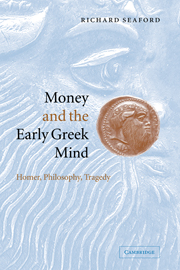Book contents
- Frontmatter
- Contents
- Preface
- List of abbreviations
- 1 Introduction
- PART ONE THE GENESIS OF COINED MONEY
- 2 Homeric Transactions
- 3 Sacrifice and distribution
- 4 Greece and the ancient Near East
- 5 Greek money
- 6 The preconditions of coinage
- 7 The earliest coinage
- 8 The features of money
- PART TWO THE MAKING OF METAPHYSICS
- References
- Index
5 - Greek money
Published online by Cambridge University Press: 22 September 2009
- Frontmatter
- Contents
- Preface
- List of abbreviations
- 1 Introduction
- PART ONE THE GENESIS OF COINED MONEY
- 2 Homeric Transactions
- 3 Sacrifice and distribution
- 4 Greece and the ancient Near East
- 5 Greek money
- 6 The preconditions of coinage
- 7 The earliest coinage
- 8 The features of money
- PART TWO THE MAKING OF METAPHYSICS
- References
- Index
Summary
From the role of sacrifice in monetisation we now proceed to Greek money in general. It will be convenient to postpone discussion of coinage, a particular form of money, to the next chapter, even though this will mean first pursuing money into the Classical period (5b) before returning to the late seventh or early sixth century (the time of the earliest coins). The distinction between coinage and unstamped precious metal – a distinction that we take for granted – was in the earliest phase of coinage not (so far as we know) linguistically expressed. Words in sixth-century texts that may refer to coins (‘stater’ and ‘drachma’) may also refer to units of weight. Such ambiguous references will be included in the broad category of money, i.e. in this chapter. Bullion, which performed money functions for the Greeks before the invention of coinage, continued to do so long after the widespread adoption of coinage. Among the Greeks money was precious metal (and occasionally bronze or iron) – or rather two precious metals (silver and sometimes gold) united by an exchange ratio – coined or uncoined.
THE EARLIEST GREEK MONEY
When do the Greeks first use money? It cannot be detected in Bronze Age Greece (4d). Nor is there any trace of money in Hesiod, in whose Works and Days, where the economic theme provided plenty of opportunity to mention money, wealth is in fact conceived of largely as the contents of a barn.
- Type
- Chapter
- Information
- Money and the Early Greek MindHomer, Philosophy, Tragedy, pp. 88 - 101Publisher: Cambridge University PressPrint publication year: 2004
- 1
- Cited by

